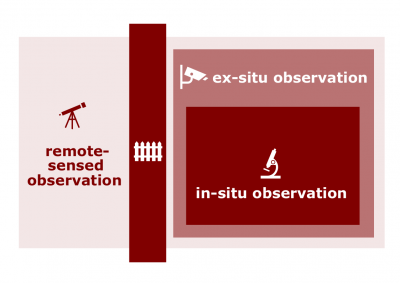Difference between revisions of "Observation"
(→Related lectures) |
|||
| Line 13: | Line 13: | ||
*[[Remote-sensed observation]]. | *[[Remote-sensed observation]]. | ||
| − | ==Related lectures== | + | ==See also== |
| − | *[[Monitoring Quarter]]. | + | |
| − | *[[What Learning Is]] | + | ===Related quotes=== |
| + | :*''You see, but you do not observe.'' -- Sir Arthur Conan Doyle, A Scandal in Bohemia | ||
| + | |||
| + | ===Related lectures=== | ||
| + | :*[[Monitoring Quarter]]. | ||
| + | :*[[What Learning Is]] | ||
[[Category: CNM Cyber Orientation]][[Category: Septem Artes Administrativi]][[Category: Articles]][[Category: Business Analysis]] | [[Category: CNM Cyber Orientation]][[Category: Septem Artes Administrativi]][[Category: Articles]][[Category: Business Analysis]] | ||
Latest revision as of 01:52, 13 November 2020
Observation is any act of recognizing and noting any subject, fact, occurrence, situation, and/or state of affairs, sometimes involving measurement with instruments, as well as the data-gathering technique that is based on watching something or someone.
An observation can also refer to a statement based on something one has seen, heard, or noticed. In business analysis, observation is a means to elicit requirements by conducting an assessment of the stakeholder's work environment.
Definitions
According to the BABOK Guide (3rd edition),
- Observation (business analysis). Studying and analyzing one or more stakeholders in their work environment in order to elicit requirements.
Types
See also
Related quotes
- You see, but you do not observe. -- Sir Arthur Conan Doyle, A Scandal in Bohemia
